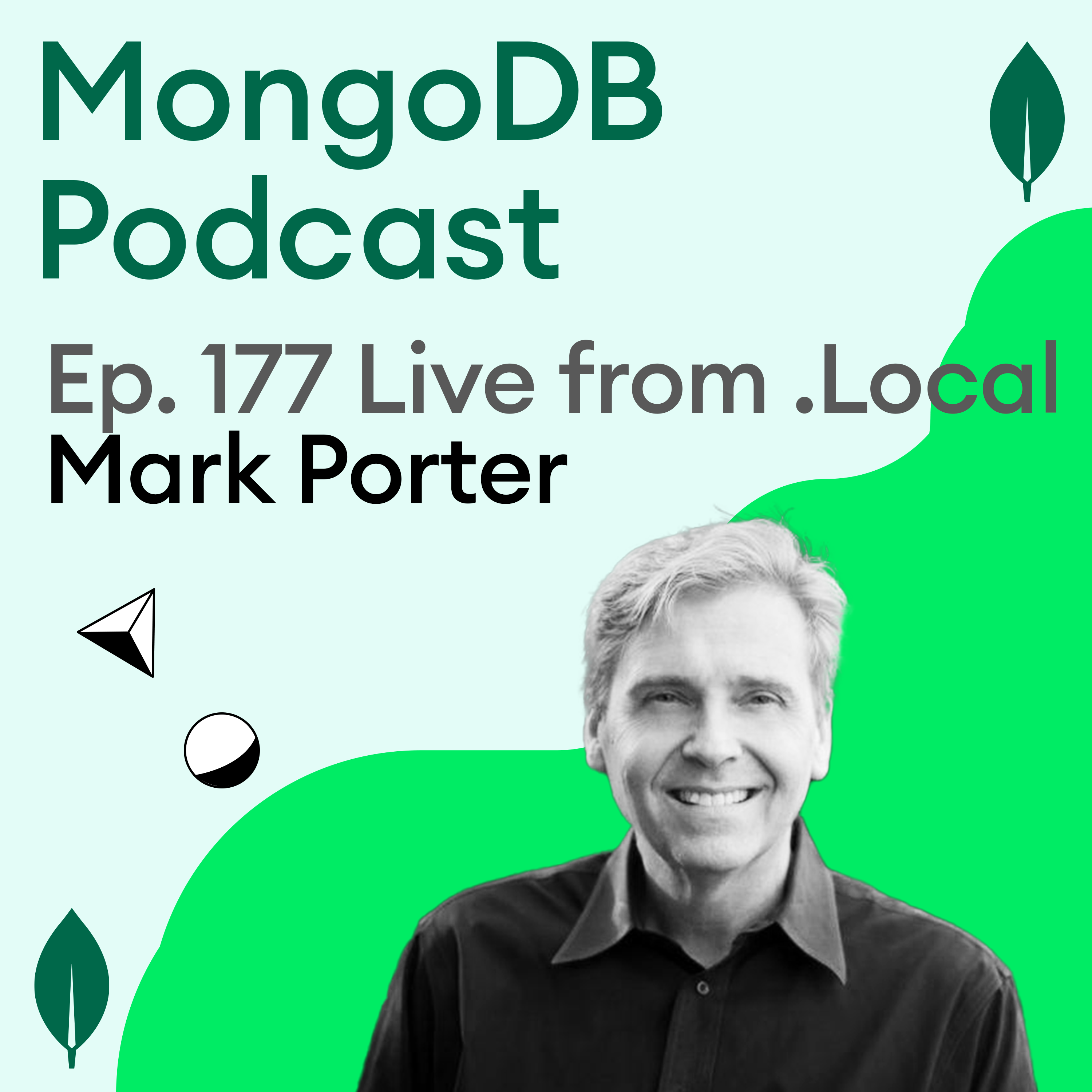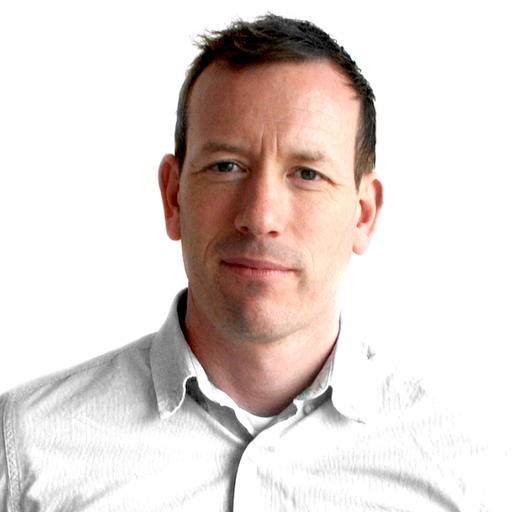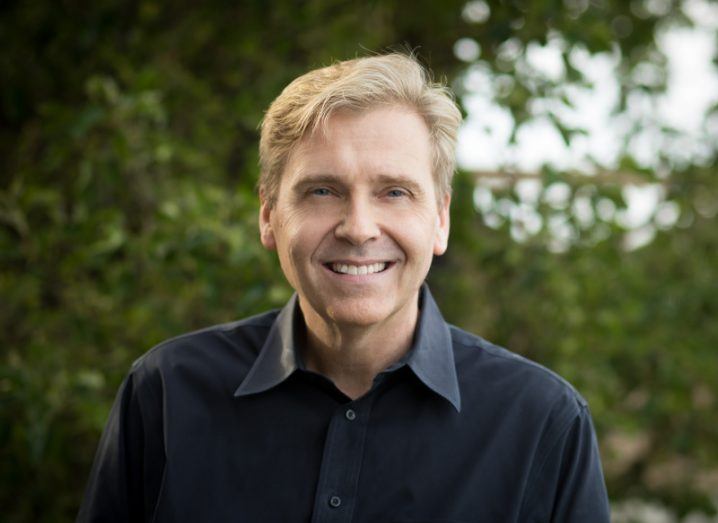
- 0.5
- 1
- 1.25
- 1.5
- 1.75
- 2
Ep. 177 The Developer's Journey with Mark Porter
Today's Host

Shane McAllister
Today's Guest

Mark Porter
Speaker 1: Thanks everybody for tuning in. We're live on LinkedIn and YouTube. And I'm delighted to welcome my next guest. Mark Porter is the Chief Technology Officer for MongoDB. Are you excited about the show?
Mark Porter: I'm totally excited about the show. We have so much going on, it's crazy. Last year we did three days. This year in order to go worldwide, we went to a one day format, but we're doing it 30 places around the world this year, to get closer to our developers. And yet we have a lot to pack into every one of these days.
Speaker 1: Yeah, yeah. And so I understand you just came from the startups session?
Mark Porter: I did. We did a startup breakfast. We had about 35 people. It was wonderful.
Speaker 1: Yeah. What's going on in the startup space? What's the buzz?
Mark Porter: So in the startup space, there's all this interest going on because as capital has become less free than it was a couple of years ago, and yet as generative AI has come along, it's almost like the hype has moved to generative AI.
Speaker 1: Yeah.
Mark Porter: And the advice I'm giving all the startup people is focus on core value, focus on delighting customers. Don't follow the hype on this. Just like don't follow the hype on the other hype cycles.
Speaker 1: Right.
Mark Porter: Build core products. And the advice I gave to them was find 10 to 15 really involved customers. Hire those customers. Fire the ones who don't give you feedback. And the ones who do give you feedback, pivot, pivot, pivot based on their feedback.
Speaker 1: Yeah, that's interesting.
Mark Porter: That's what successful startups do.
Speaker 1: Yeah. So fire your customers.
Mark Porter: Yeah. Stick with the ones who give you feedback.
Speaker 1: Yeah.
Mark Porter: Yeah.
Speaker 1: We love that. We love that. So you've been doing this quite some time. Talk a little bit about your background. How did you end up at MongoDB?
Mark Porter: I made a LinkedIn post last night about my cultural hints, and when I did that, I noticed that I've been writing software professionally for 45 years.
Speaker 1: Wow.
Mark Porter: From 1978 on. So that is a long time.
Speaker 1: That is a long time.
Mark Porter: I've been at Oracle. I was one of the core founders there of the database team. I was at AWS running RDS. I was at Grab, the Uber of Southeast Asia. And I ended up at MongoDB fundamentally because I've been frustrated with the databases that I've been building for 40 years of my career.
Speaker 1: Yeah.
Mark Porter: And they don't scale well. They betray you right when you need the most. They're hard to program against. And as I got to know MongoDB, I found out that MongoDB was the thing that I had been excited about. And I asked Dave, our CEO, I said, " Can I please join your company?"
Speaker 1: Yeah.
Mark Porter: And after three or four months of convincing him, he let me join. It's a privilege to be here.
Speaker 1: Yeah. And it's great to have you. So what inspired you to become a developer? How did you get started?
Mark Porter: So the funny thing is, I think developers, we're a little bit of a strange breed.
Speaker 1: Yeah.
Mark Porter: We love solving problems, so we love playing Adventure and solving the puzzles in Adventure, that old game. We love solving puzzles with chess. And software is solving puzzles. Now, the interesting thing is as my career has gone on, I still solve puzzles, but I run a group of 1000 people now, and the puzzles are different.
Speaker 1: Yeah.
Mark Porter: There's technical puzzles, there's organizational puzzles, there's budget puzzles, but they're still puzzles.
Speaker 1: Yeah.
Mark Porter: Yeah.
Speaker 1: I love that perspective because a lot of times you think of a developer as someone who's not necessarily extroverted, not necessarily working extensively with other people, mainly focusing on the code. That's not you, Mark.
Mark Porter: No. I'm not wild about that portrayal of developers. I actually find that developers are incredibly extroverted with their code.
Speaker 1: Yeah.
Mark Porter: They're extroverted on Slack, they're extroverted all over the place. Maybe they're not great in person to person. I find that developers, when you give them the right opening, they want to talk about what they're doing, they want to talk about things.
Speaker 1: Yeah. Yeah.
Mark Porter: It might be a little awkward. I mean, I certainly was.
Speaker 1: I fall into that category. I love to write code, but I also love to talk to people, hence the podcast. But how do you define success for a developer? You've got quite a large team. What does success look like for a developer at MongoDB?
Mark Porter: When I think about success as a developer at MongoDB, it's success as a developer. It's passion for your craft, literally caring about the details. Don't go and be, " I did two years on this and two years on this and two years on this." You're going to get 12 years into your career having done six shallow things.
Speaker 1: Yeah.
Mark Porter: And you're going to be in a hard spot. Be deep and meaningful at what you do. And so success for a developer is being an expert. Be the best at something, whether it is debugging the software you're working on, whether it's the CIDC system, whether it's the mathematical algorithm you're using, really focus on being proud of what you do. Arrogant.
Speaker 1: Right.
Mark Porter: But proud.
Speaker 1: Yeah.
Mark Porter: And dig deep because where real non- linear value comes from is people who dig deep. There's the old phrase that Larry Ellison and Steve Jobs used to say is, " That two developers sitting side by side, same background. It is not unusual for one of them to be worth 10X to the company as the other one."
Speaker 1: Wow.
Mark Porter: And that's because they dig deep and they figure out those meta problems and their leverage is unbelievable.
Speaker 1: Well, you've clearly done that in your extensive career. What are some of the things you're most proud of or most excited about in your accomplishments?
Mark Porter: So I've transitioned from helping computers do things to helping people do things. And that's been quite the transition.
Speaker 1: Yeah.
Mark Porter: And now it's helping cultures do things. And so as I've moved ahead in my career, I've realized that there are more ambiguous problems to solve. And so one of those was coming into AWS RDS and having a team that was an operational disaster, that was just too many tickets, too much load. And six years later, we were one of the most operationally healthy teams at AWS. I'm so proud of that.
Speaker 1: Yeah. A lot of new developers are coming into the space through the lens of MongoDB. They're using the developer data platform. They're using the extensive set of tools that we provide. What advice would you have for someone just starting out as a developer today?
Mark Porter: I would give you advice to think really hard about, like I said, your depth, passion, where you go. I would not follow shiny new things. And I would surround yourself, and this is the hard thing for developers first coming in, find three or four people who've been in the field a long time and get to know them and invest in those relationships. When you start out your career, it's so easy to invest in the relationship with your keyboard. Invest in the relationship with people around you. I had mentors from the day I started at NASA, from the day I started at Oracle, and I have mentors at MongoDB. And they're the ones who move my career ahead. They're the ones who say, " You're not thinking about that right? Have you thought about it this way?" And you don't get that from just sitting in front of your keyboard. And your career will be somewhat linear unless you get those insights.
Speaker 1: Yeah. So perspective, it's about gaining additional perspectives.
Mark Porter: Additional perspective, and mentorship.
Speaker 1: Right.
Mark Porter: And being able to question yourself. There's this thing about strong opinions weakly held, and strong opinions strongly held, and all this. The best people form strongly held opinions, but when new data comes in, they're willing to change them immediately. And I guess my advice to people would be willing to do that about yourself. Which is really hard.
Speaker 1: It is.
Mark Porter: Kind of attacks our self- worth and it's hard to do in public, but it's the way you will succeed in your career.
Speaker 1: We're live with Mark Porter, CTO of MongoDB, and we're leading up to the keynote. Some exciting things happening today. I want you to stay tuned. Mark, what are you excited about for today?
Mark Porter: So I'm so excited about, we're releasing features that are very exciting in the space of AI. You're going to hear things about that. We're releasing features in the space of platform performance, which performance of a database is so important, and resilience. We're releasing features for developer experience, making it easier and easier to use the database, which frankly is already the easiest database to use. And you're going to hear about all those in the keynote, and we're going to stuff an awful lot into 60 minutes.
Speaker 1: Yeah. Exciting times. Live from the Javits Center in New York City, it's MongoDB. Local 2023. We're here with Mark Porter, CTO of MongoDB. I wanted to ask you about, you mentioned mentorship. It's extremely important in my career as well. Who are some of the mentors that helped you along the way?
Mark Porter: One of them happens to be our Chairman of the Board right now, who was my mentor for a long time before I joined the company. One was the CTO of Yahoo. And another one was the CTO of a very large New York company. And these people just called me on my crap all the time.
Speaker 1: Yeah.
Mark Porter: They just sat there and said, " Mark, you're thinking about this wrong. Have you thought about this?" And so I had to have a relationship with these people where it was a two- way mentoring relationship. I added value to them and they added value to me.
Speaker 1: Yeah.
Mark Porter: Otherwise, the mentorship relationship goes for 1, 2, 3 meetings and fizzles out.
Speaker 1: Yeah.
Mark Porter: With all three of these people, we give each other value. And so again, mentorship is important. A two- way mentorship is the only long- term mentoring relationship you'll ever have.
Speaker 1: Yeah. Great. Great advice. Well, so we're leading up to the keynote. Very excited to go right from the booth to the keynote. We're live at MongoDB. Local 2023 here at the Javits Center in New York City. Mark, I want to thank you for stopping by. Is there anything else you'd like to share with the audience before we wrap up?
Mark Porter: I just want to let people know that we remain focused on developers. It's the core of the company. And I'm the CTO MongoDB. I'm on LinkedIn. You can reach out to me whenever you want and I would love to talk to anyone about your developer experience.
Speaker 1: Fantastic.
Mark Porter: Using MongoDB products.
Speaker 1: Yeah. Fantastic. Well, Mark, thanks so much for stopping by.
Mark Porter: You're so welcome.
Speaker 1: Yeah.
Mark Porter: Okay.
Speaker 1: Talk soon.
Mark Porter: Thanks.
Speaker 1: Thanks.
Mark Porter: Bye.